Tank size: 170cm L x 50cm W x 60cm H
tank age: 4 months
pH: 6,6
ammonia: 0
nitrite: 0
nitrate: 0
kH: 4
gH: 5
tank temp: 26 C
5 or 6 weeks ago, I have my corydoras sick and apply treatment to my tank with salt and with no result, added waterlife myxazin and later waterlife octozin. My corydoras totally recover.
After this, I bought a group of Angelfish, one betta, two l018, and some small fish.
I quarentine most of them but the betta and angelfish, because my other tank as small guppies and this fish will eat them.
4 or 5 days after add angelfish they start to have symptoms of some disease.
Fish Symptoms: betta seems with finrot, but angelfish are the must affected. Stopped on the top of the tank with nose up or hidden on bottom of the tank, red on the base of pectoral fins, some with whitish mucous on the head. Next phase are red nose, strange mouth like pleco mouth and eyes seems little poped. They stop to eat also.
I have moved they to a plastic container (last time Ihave algea after apply meds to my main tabl) and 75% water change every day. Start with salt, myxazin and octozin. They seem more active and start to eat (except one altum x scalare hybrid that are very picky), but external symptoms seem worst. Finrot on ventral and pectoral fins, more red on pectoral fins, more red noses, more poped eyes and strange mouth, some have red line on top of their dorsal.
The black one has a bog white spot on their side.
2 small ones are in the main tank because don’t have symptoms, and two big ones moved today because started with symptoms today of white film on head.
I really need help. Until now, seems only affecting angelfish, corydoras, ancistrus, rammirezzi, l018, guppies, carinal tetra, all seems ok.
I have already buy an 200l tank to quarentine all my fish in the future and to move this one in the plastic container.
I add photos, but aren’t very good because are taken from the top of the container.
Volume and Frequency of water changes: 60-70% every week
Chemical Additives or Media in your tank: Prime, tropica fertilizers
Tank inhabitants: 2 Germany Blue Ramirezzi, 10 tetra cardinal, 6 guppies, 6 black phantom, 6 white tip tetra, 2 small l018, 1 ancistrus very small, 10 corydoras sterbey and 10 corydoras julli
Recent additions to your tank (living or decoration): the angelfish and 1 betta
Exposure to chemicals: none
Digital photo (include if possible): attached
tank age: 4 months
pH: 6,6
ammonia: 0
nitrite: 0
nitrate: 0
kH: 4
gH: 5
tank temp: 26 C
5 or 6 weeks ago, I have my corydoras sick and apply treatment to my tank with salt and with no result, added waterlife myxazin and later waterlife octozin. My corydoras totally recover.
After this, I bought a group of Angelfish, one betta, two l018, and some small fish.
I quarentine most of them but the betta and angelfish, because my other tank as small guppies and this fish will eat them.
4 or 5 days after add angelfish they start to have symptoms of some disease.
Fish Symptoms: betta seems with finrot, but angelfish are the must affected. Stopped on the top of the tank with nose up or hidden on bottom of the tank, red on the base of pectoral fins, some with whitish mucous on the head. Next phase are red nose, strange mouth like pleco mouth and eyes seems little poped. They stop to eat also.
I have moved they to a plastic container (last time Ihave algea after apply meds to my main tabl) and 75% water change every day. Start with salt, myxazin and octozin. They seem more active and start to eat (except one altum x scalare hybrid that are very picky), but external symptoms seem worst. Finrot on ventral and pectoral fins, more red on pectoral fins, more red noses, more poped eyes and strange mouth, some have red line on top of their dorsal.
The black one has a bog white spot on their side.
2 small ones are in the main tank because don’t have symptoms, and two big ones moved today because started with symptoms today of white film on head.
I really need help. Until now, seems only affecting angelfish, corydoras, ancistrus, rammirezzi, l018, guppies, carinal tetra, all seems ok.
I have already buy an 200l tank to quarentine all my fish in the future and to move this one in the plastic container.
I add photos, but aren’t very good because are taken from the top of the container.
Volume and Frequency of water changes: 60-70% every week
Chemical Additives or Media in your tank: Prime, tropica fertilizers
Tank inhabitants: 2 Germany Blue Ramirezzi, 10 tetra cardinal, 6 guppies, 6 black phantom, 6 white tip tetra, 2 small l018, 1 ancistrus very small, 10 corydoras sterbey and 10 corydoras julli
Recent additions to your tank (living or decoration): the angelfish and 1 betta
Exposure to chemicals: none
Digital photo (include if possible): attached
Attachments
-
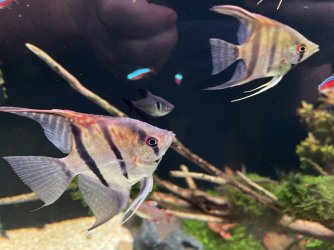 25B5A710-6762-4DFA-B378-C82F0A8D5B2A.jpeg220.4 KB · Views: 47
25B5A710-6762-4DFA-B378-C82F0A8D5B2A.jpeg220.4 KB · Views: 47 -
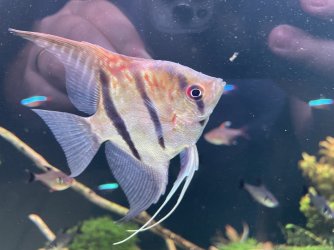 432277C9-821A-4259-A346-E3C31BD28D95.jpeg213.9 KB · Views: 47
432277C9-821A-4259-A346-E3C31BD28D95.jpeg213.9 KB · Views: 47 -
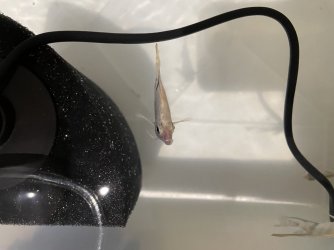 6F251C6D-8037-418C-8DF7-B74BA6BB6ED7.jpeg181.7 KB · Views: 50
6F251C6D-8037-418C-8DF7-B74BA6BB6ED7.jpeg181.7 KB · Views: 50 -
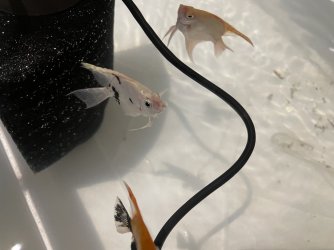 9DFB8AAF-7193-4232-AB80-FE9E4BE28703.jpeg181.7 KB · Views: 49
9DFB8AAF-7193-4232-AB80-FE9E4BE28703.jpeg181.7 KB · Views: 49 -
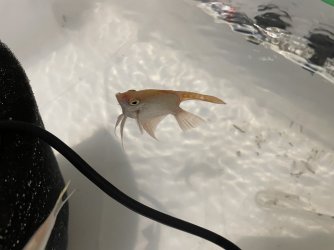 89647D63-7860-4EC3-93F2-49087D163AB3.jpeg143.5 KB · Views: 41
89647D63-7860-4EC3-93F2-49087D163AB3.jpeg143.5 KB · Views: 41

